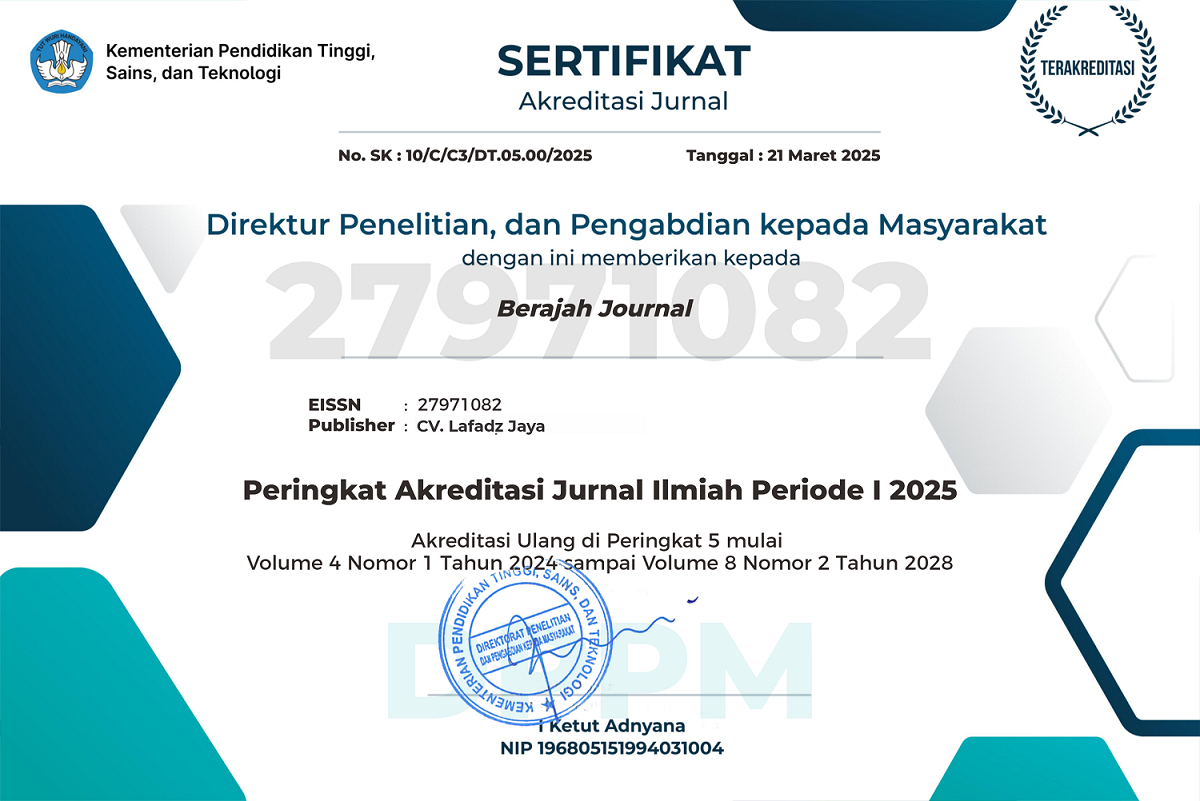STUDI ISLAM DENGAN PENDEKATAN TASAWUF MISTISEM ISLAM
DOI:
https://doi.org/10.47353/bj.v4i9.474Keywords:
Sufism, Islamic Mysticism, Islamic Spirituality, Fana, Baqa, Mystical Experiences, Dhikr, Sufi Teachings, Contemporary IslamAbstract
The study of Islam with an approach to Sufi mysticism focuses on the spiritual dimension of Islam, emphasizing the pursuit of closeness to God through inner experiences such as dhikr and meditation. Sufism offers an approach that differs from the legal and social aspects of Islam, prioritizing unity with God and the purification of the soul. This research explores the history of Sufism, mystical experiences like fana and baqa, and critiques of Sufi practices from both traditional and reformist scholars. Additionally, Sufism is examined in the context of contemporary Islamic society, connecting it with psychology and philosophy to balance rational and spiritual aspects. This journal aims to provide insights into Sufism’s contribution to character formation and spirituality among Muslims, as well as its relevance in a modern, materialistic world
Downloads
References
Ahmad Jais. (2023). Konsep Fana dan Baqa dalam Tasawuf Islam. Jakarta: Penerbit Al-Qalam.
Al-Ghazali, A. H. M. (2000). Ihya Ulumuddin (The Revival of the Religious Sciences). Beirut: Dar al-Kutub al-Ilmiyyah.
Arabi, I. (2011). Fusus al-Hikam (The Bezels of Wisdom). Kuala Lumpur: Institut Imam Muhammad bin Saud.
Badawi, J. (2018). Sufism: A Critical Introduction. London: I.B. Tauris.
Darwish, T. (2019). The Sufi Path of Love: The Spiritual Teachings of Rumi. New York: HarperCollins.
Denny, F. M. (2005). An Introduction to Islam. Cambridge: Cambridge University Press.
Fadel, M. (2021). Tasawuf dan Pembentukan Karakter Umat Islam. Bandung: Penerbit ITB Press.
El-Wardany, Y. (2005). Sufism: The Formative Period. Albany: State University of New York Press.
Ernst, C. (2011). Sufism: An Introduction to the Mystical Tradition of Islam. New York: Bloomsbury Academic.
Geaves, R. (2004). The Sufi Journey: History and Politics of a Modern Movement. Oxford: Oxford University Press.
Ghazali, A. (2006). The Alchemy of Happiness. New York: Oxford University Press.
Iqbal, M. (2010). The Reconstruction of Religious Thought in Islam. London: Oxford University Press.
Knysh, A. (2010). Islamic Mysticism: A Short History. London: Thames & Hudson.
Lewis, B. (2002). What is Sufism?. New York: Paulist Press.
Maulana, A. (2022). Pengaruh Tasawuf terhadap Kebudayaan Islam. Yogyakarta: Pustaka Pelajar.
Nasr, S. H. (2007). Islamic Spirituality: Foundations. Albany: State University of New York Press.
Nasr, S. H. (2010). The Garden of Truth: The Vision and Promise of Sufism, Islam's Mystical Tradition. San Francisco: HarperOne.
Pannikar, S. (2003). Sufi Traditions in Modern India. New Delhi: Penguin Books India.
Qutb, S. (2013). In the Shade of the Quran. London: Islamic Book Trust.
Rumi, J. (2008). The Essential Rumi. New York: HarperOne.
Sachedina, A. A. (2009). The Islamic Roots of Democratic Pluralism. New York: Oxford University Press.
Schimmel, A. (1975). Mystical Dimensions of Islam. Albany: State University of New York Press.
Shah, S. A. A. (2014). The Book of Sufi Healing. Albany: State University of New York Press.
Sells, M. A. (2003). Approaching the Qur'an: The Early Revelations. Princeton: Princeton University Press.
Sharif, K. (2017). Tasawuf dan Pemikiran Islam Modern. Jakarta: Pustaka Utama.
Smith, J. I. (1995). The Meaning and End of Religion. New York: Macmillan.
Ummah. (2019). Praktik Tasawuf dalam Kehidupan Sehari-hari. Jakarta: Penerbit Ummah.
Yuzki, A., & Nawafi, M. (2020). Pengaruh Tasawuf terhadap Budaya dan Seni Islam. Bandung: Penerbit Andi.
Zaman, M. Q. (2002). Religious Trends in the Middle East. Princeton: Princeton University Press.
Zubaida, S. (2018). Sufism and Modernity: Pathways to Spiritual Renewal. London: Routledge.
Downloads
Published
How to Cite
Issue
Section
License
Copyright (c) 2024 Aziz Lukman Hakim Mustaqim, Mas Enong Fatonah, Khamid Maulana, Hajam, Theguh Shaumantri

This work is licensed under a Creative Commons Attribution 4.0 International License.






















